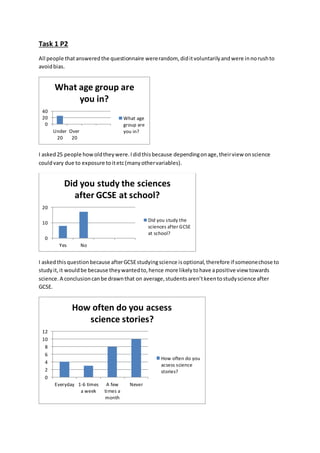
Views on Science Questionnaire Results
- 1. Task 1 P2 All people that answered the questionnaire were random, did it voluntarily and were in no rush to avoid bias. 40 20 0 What age group are Under 20 Over 20 you in? What age group are you in? I asked 25 people how old they were. I did this because depending on age, their view on science could vary due to exposure to it etc (many other variables). 20 10 0 Did you study the sciences after GCSE at school? Yes No Did you study the sciences after GCSE at school? I asked this question because after GCSE studying science is optional, therefore if someone chose to study it, it would be because they wanted to, hence more likely to have a positive view towards science. A conclusion can be drawn that on average, students aren’t keen to study science after GCSE. 12 10 8 6 4 2 0 How often do you acsess science stories? Everyday 1-6 times a week A few times a month Never How often do you acsess science stories?
- 2. I asked this question because it not only shows peoples eagerness to update themselves on the world of science but depending on how often they access science stories could skew their view one way or another. A conclusion can be drawn that in general people I asked don’t update themselves frequently in the world of science. Where do you get your science stories from? 20% 12% 60% 8% TV Internet Magazines Newspaper I thought that this question was appropriate because depending on the medium they get their news could show how reliable the news they get was. E.g. Tabloid newspapers are often sensationalist and cannot entirely be trusted. What was the last science story 52% 20% 8% 20% you acsessed? Ebola GH crops Probe landing on comet Global warming 15 10 5 0 How relaible do you think this story was (4 being the most reliable) 1 2 3 4 How relaible do you think this story was (4 being the most reliable)
- 3. These two questions were chosen to see which story is dominating the media right now and if people thought that they were reliable or not. 10 people thought they were very reliable which may be a problem depending on where they get their information. This could suggest that people are easily convinced on the authenticity of science stories. Q: What comes to mind when you think scientist? White lab coats = 2 High earners = 7 Boring/crazy people = 8 Academic research’s = 5 Solution finders = 3 The general perception of scientist to the people I asked were white lab coats, suggesting they work in labs and this is how the media portrays them. Evaluation From this questionnaire various conclusions can be drawn. The first being that science isn’t portrayed in a particularly positive or interesting light by the media, this can be found as 32% of people I asked said that scientist were boring and crazy people, also the fact that 68% of people I asked that didn’t do science after GCSE suggests that science isn’t a major interest of the average person under 20. It is also worth pointing out that over 72% of the people I asked actively accessed science stories a few times a month or less, this further strengthens the point that science isn’t portrayed in a interesting light in the media as people would be more interested and re ad up on it more. Another conclusion could also be drawn that the public have too much trust in media presented science stories. 40% of people thought the stories they accessed were very reliable when this may not be the case and without having done research on it themselves. I also found that 60% of people got their source of science information from the internet which is often very sensationalised and easy to put out opinions and unproven theories as facts. The media have a very big role in shaping the public’s attitude on science. As I mentioned previously, 40% of people thought the stories they accessed were very reliable meaning that if a tabloid newspaper were to release a that GM crops gave people cancer they would be very inclined to believe it and instantly dismiss the benefits of science on the particular matter, giving them a bad attitude to science. If someone wanted to get as much exposure to as many people under 20 as possible through two mediums the best to choose would be the internet and TV, combined 80% of people got their information from these places, according to my questionnaire most people would trust the information too.